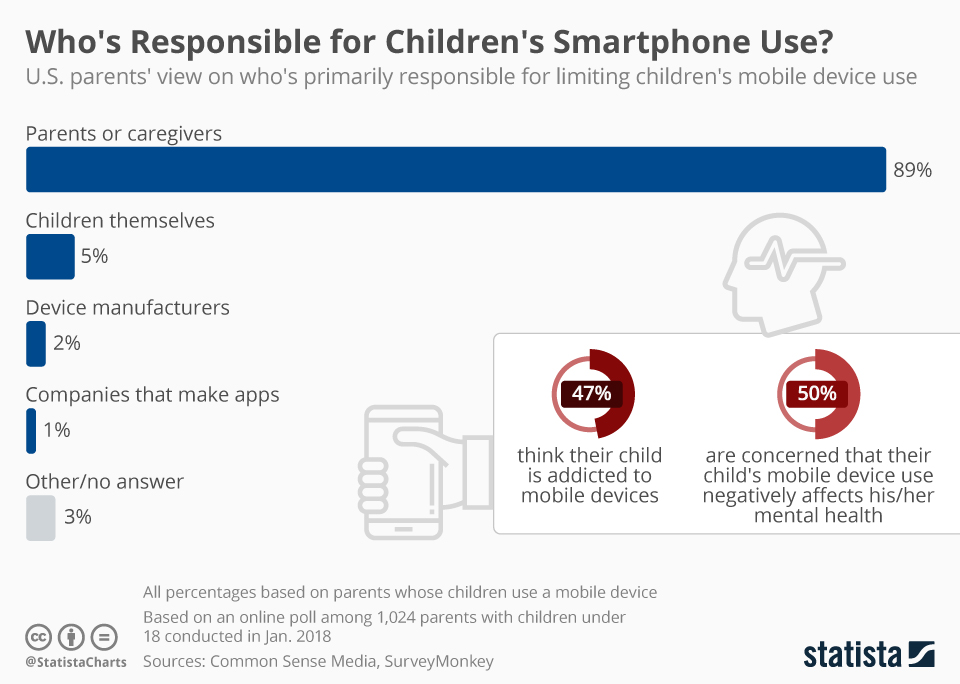Okay, I’m only 22 and kids aren’t in my cards for another four to six years or so. Nevertheless, a few weeks ago, I found myself in a (non-theoretical) conversation about when kids should be given mobile phones. So, for this week’s blog post, I thought I’d look into it some more (and see what the internet says).
How did I get into this conversation? I was hanging out with some people from my yoga teacher training who have young children, and one of them found herself in the dilemma that her kids are approaching an age when other children in their class start having phones — and she’s not sure what to do.
So, she asked me and some of the other younger trainees how old we were when we were given our first phone. The answers varied quite a bit and this made me curious. Personally, I received my first phone in 2007. It was a hand-me-down from my grandpa — and a Nokia brick if ever there was one. It could call, text, and maybe take a few pictures but that was it. I was eight.
Others we talked to had received their first phone when they were around 10-13 which is about the same as my peers as far as I remember.
Today though, the world looks different and it seems like some kids are almost born with an iPhone.
When do kids get their first phone?
According to a survey by Common Sense Media, 11% of eight-year-olds had a smartphone in 2015. In 2019, that number had risen to 19%. Unfortunately, there isn’t a statistic for 2020 or 2020 but my guess is that it’s around the same or higher than 2019.
So, we know that the age at which children get their first phone is decreasing, but exactly how young are they? A 2020 blog post by the US Children’s Bureau says that “the average age kids get a phone is between 12 and 13.” However, a 2019 survey made by the Swedish telecommunications multinational, Telia, showed that kids in Denmark are eight years old (on average) when they get a phone.
Hence, the beliefs about the “right” age differ quite a bit from country to country.
What do the experts say?
So what should the mom from yoga teacher training do if she’d asked experts rather than us? If she follows Common Sense Media’s advice, then there isn’t some magic threshold for when a child is responsible enough to handle a phone and the freedom it gives.
Rather, parents should ask themselves:
- Do your kids show a sense of responsibility, such as letting you know when they leave the house? Do they show up when they say they will?
- Do your kids tend to lose things, such as backpacks or homework folders? If so, expect they might lose an (expensive!) phone, too.
- Do your kids need to be in touch for safety reasons?
- Would having easy access to friends benefit them for social reasons?
- Do you think they’ll use cellphones responsibly — for example, not texting during class or disturbing others with their phone conversations?
- Can they adhere to limits you set for minutes talked and apps downloaded?
- Will they use text, photo, and video functions responsibly and not to embarrass or harass others?
Source: Common Sense Media
Bill Gates disapproves
How old should kids be then? Eight? 10? 12? Not according to Bill Gates. Some years back, he gave an interview with The Daily Mirror in which he revealed that none of his children received smartphones until the age of 14.
Additionally, the Gates family has a strict no-phones-at-the-dinner-table rule and a limit on screentime. But, as the co-founder of Microsoft, he probably has seen the best and worst sides of digital media and wants to screen his kids from that.
The question is if the rest of parents should do the same?
 You will find more infographics at Statista
You will find more infographics at Statista
Source: Statista
Feature Image: Tima Miroshnichenko/Pexels



I think being the first or the second child also makes a great difference when you get a phone! I, being a first child, received my phone at the age of 12. This was an old flip phone on which you could only call and play Tetris. A year after, I received my first smartphone, which was still an old model. In contrast with me, my younger brother received his first phone, this instantly was a smartphone, and he was 10 years old.
The thing is, this was only done because I had a smartphone as well, and I had no trouble with the ‘responsibility of having a phone’. The good example I set must have been a confirmation for my parents to give my brother a phone as well. I think that if I had been terrible with the phone, using up my ‘calling minutes’ etc, it would have taken much longer for my brother to get a phone as well.
This is why I think that the phone experience of the oldest child, greatly influences the moment the younger child will get his/her first phone.
I really enjoyed reading your post and also the discussion in class was interesting to listen to. It made me think about when me and my sister got our first phones, I don’t remember exactly at what age though. Nevertheless, I still know her first phone was one of those old slide phones (not even a flip phone haha) from Sony Ericcson; does this brand even exist still? Anyways, all you could do with this phone was calling, send SMSes and download/send ringtones and songs to each other via bluetooth. Funny times… To be honest, I don’t know what I would do if I had kids. Sure, having a phone is useful and good for emergencies and stuff, but I’d definitely wouldn’t buy them a smartphone. Seeing all those kids nowadays, only looking at their screens in restaurants, in the city, literally everywhere… seems kind of sad to me. Personally, I really enjoyed the time when I was a kid, spending time with my friends outside the whole day, knocking on their doors to ask their parents if then can come out to play etc. I’m really glad I didn’t grow up with so much digital devices but of course today it’s not really possible to go 100% without them.
A very interesting and contemporary topic to write about! It is a subject that I have been often thinking as well. The first time I thought of such a thing was when I started seeing all those kids in restaurants, or other public places, where they don’t interact with the outside world but just play with the smartphones or tablets in their hands. For some reason, I found it very disturbing that a child was looking at an LED screen, very hypnotized… Even though there would be other kids at the table, they wouldn’t be interacting with each other. While I was feeling sorry for them, I felt glad that in my childhood, there weren’t such devices that hindered the development of my social skills. Today’s world is dangerous, and people are not trustworthy. So, if I was a parent, I would give my child a communication device for safety issues. Internet is a very dangerous place, and when I was young I visited dangerous websites. While it can be a try-and-see kind of process for children to learn about their privacy and safety on the internet, it is also very risky. People from my generation and grew up relatively without such devices, and even though I feel positive about it, it should not mean that that was the right way of growing up. This is the way today’s world works, and these kids will see both the positive and negative effects of it in the future. I am very curious to see.